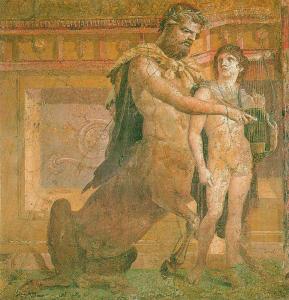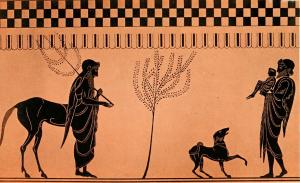
The Education of Achilles by Chiron, fresco from Herculaneum, 1st century CE
Mild to moderate Covid-19 cases
On March 6, 2020, WHO advised:
“For COVID-19, data to date suggest that 80% of infections are mild or asymptomatic, 15% are severe infection, requiring oxygen and 5% are critical infections, requiring ventilation.”
On May 29, 2020, the CDC quoted a Chinese study with very similar figures:
“The largest cohort of >44,000 persons with COVID-19 from China showed that illness severity can range from mild to critical:
Mild to moderate (mild symptoms up to mild pneumonia): 81%
Severe (dyspnea, hypoxia, or >50% lung involvement on imaging): 14%
Critical (respiratory failure, shock, or multiorgan system dysfunction): 5%”
On June 12, 2020, Scripps Research Institute reported that:
“The findings, published in Annals of Internal Medicine, suggest that asymptomatic infections may account for as much as 45 percent of all COVID-19 cases, playing a significant role in the early and ongoing spread of COVID-19. The report highlights the need for expansive testing and contact tracing to mitigate the pandemic.”
On April 23, 2020, The New York Times reported that:
“A new study of thousands of hospitalized coronavirus patients in the New York City area, the epicenter of the outbreak in the United States, has found that nearly all of them had at least one major chronic health condition, and most — 88 percent — had at least two.
Though earlier research has shown chronic conditions like obesity, high blood pressure and diabetes are common risk factors for severe Covid-19, the ubiquity of serious medical conditions in these patients was striking: Only 6 percent of them had no underlying health conditions. …
Nearly 60 percent of those hospitalized at the Northwell facilities had high blood pressure, 40 percent were obese, and about one-third had diabetes. Smaller numbers of patients suffered from other chronic illnesses, such as heart disease, kidney disease and chronic respiratory illnesses.”
On June 19, 2020, Yale Medicine advised regarding mild and moderate symptoms:
“Dr. Ellman notes. ‘And there are some people with very mild symptoms, who may feel like they have a sore throat, some nasal congestion, a little cough, some achy muscles, and maybe a low-grade fever,’ he says.
Symptoms, which can also include shortness of breath, chills, and headache, may appear two to 14 days after virus exposure.
‘A loss of sense of smell or taste is also a good clue that you have COVID and not another cold virus,’ Dr. Ellman says. ‘Patients have told me it comes on very abruptly—that one hour they are fine, and the next they can’t smell or taste a thing.’ …
Patients with mild to moderate symptoms tend to have more respiratory problems and a fever, Dr. Ellman says. ‘A lot of them describe nighttime fevers and sweats and have a significant cough that can be unsettling. They may also have shortness of breath or a feeling of chest pressure or heaviness,’ he adds. ‘They may feel extremely wiped out. To get up and get a glass of water requires a big effort.’
Some of these patients will recover at home, but it may take longer than the milder cases, Dr. Ellman says. … ‘I have definitely seen people feel very sick for several weeks, and it can take a while for their strength and stamina to come back,’”
On April 21, 2020, NPR reported:
“Some COVID-19 survivors will never recover completely from a condition known as post-intensive-care-unit syndrome, she says. It can produce long-term disabilities from muscle wasting, organ damage, brain damage, and PTSD. …
One of the most common problems among ICU survivors is weakness and fatigue, Bellinghausen says. ‘That whole time in the ICU, they’re losing muscle mass. People lose 20,30,40 pounds over a week or two.’
As a result, ‘things like walking the dog, going up a flight of stairs, doing your laundry are really, really difficult to do,’ she says.
And many COVID-19 patients will also have organ damage, which can be caused by the virus itself, or the extreme measures used to keep them alive.
‘People can have scarring in their lungs, sometimes kidneys are impacted, but really any organ can suffer injury in the ICU,’ Bellinghausen says.
The brain is especially vulnerable.”
The above data tells us that
- 45% of those infected with Covid-19 are asymptomatic.
- 35-36% of Covid-19 cases are moderate requiring home treatment only, but will require several weeks of recovery.
- Of the 19-20% of cases requiring hospitalization, 94% had at least one major chronic health condition. Those who survive, often never fully recover.
My fervent wish is to increase the number of asymptomatic cases, if only by a few patients. The most logical way to achieve this is by strengthening the immune system.
To reduce the number of patients requiring hospitalization for Covid-19 would require overcoming at least one major chronic health condition in 94% of cases. This is a much more difficult goal to achieve, although weight loss and switching to a healthy diet would certainly be a step in the right direction.
The Immune System—The Body’s Defense Against Infection
In July 2018, the CDC explained how the body fights illness.
“When germs, such as bacteria or viruses, invade the body, they attack and multiply. This invasion, called an infection, is what causes illness. The immune system uses several tools to fight infection. Blood contains red blood cells, for carrying oxygen to tissues and organs, and white or immune cells, for fighting infection. These white cells consist primarily of macrophages, B-lymphocytes and T-lymphocytes:
- Macrophages are white blood cells that swallow up and digest germs, plus dead or dying cells. The macrophages leave behind parts of the invading germs called antigens. The body identifies antigens as dangerous and stimulates antibodies to attack them.
- B-lymphocytes are defensive white blood cells. They produce antibodies that attack the antigens left behind by the macrophages.
- T-lymphocytes are another type of defensive white blood cell. They attack cells in the body that have already been infected.
The first time the body encounters a germ, it can take several days to make and use all the germ-fighting tools needed to get over the infection. After the infection, the immune system remembers what it learned about how to protect the body against that disease.
The body keeps a few T-lymphocytes, called memory cells, that go into action quickly if the body encounters the same germ again. When the familiar antigens are detected, B-lymphocytes produce antibodies to attack them.”
For a healthy individual, having a robust immune system is the key to fighting off Covid-19.
How Vaccines Work
In July 2018, the CDC explained how vaccines work:
“Vaccines help develop immunity by imitating an infection. This type of infection, however, almost never causes illness, but it does cause the immune system to produce T-lymphocytes and antibodies. Sometimes, after getting a vaccine, the imitation infection can cause minor symptoms, such as fever. Such minor symptoms are normal and should be expected as the body builds immunity.
Once the imitation infection goes away, the body is left with a supply of ‘memory’ T-lymphocytes, as well as B-lymphocytes that will remember how to fight that disease in the future. However, it typically takes a few weeks for the body to produce T-lymphocytes and B-lymphocytes after vaccination. Therefore, it is possible that a person infected with a disease just before or just after vaccination could develop symptoms and get a disease, because the vaccine has not had enough time to provide protection.”
Vaccines essentially tweak our innate immune system. Thus, even those who require a vaccine still need to be mindful of strengthening their immune system as much as possible.
Before discussing physical techniques, I’d like to suggest a highly renowned divine healer from Ancient Greece to call on, so as to give us a bit of an edge.
Cheirôn (Chiron)
Cheirôn (Chiron) is the wisest and most just of all the Kentauroi (Centaurs – a Thessalian tribe of half-horse men). Cheirôn’s home is on Mount Pelion, located in southeast Thessaly. Unlike his brethren, Cheirôn is an immortal son of the Titan Kronos (Cronus) and an Ôkeanis (Oceanid – water nymph), Philyra. When Kronos’ tryst with Philyra was interrupted by Rhea, he transformed himself into a horse to escape notice and the result was this two-formed son.
“Cheirôn is known as the first healer; he taught the arts of medicine, surgery, and the knowledge of herbs for various ailments. He mentored heroes such as Jason, Asklepios, and Achilles. He was abandoned at birth for being a monstrosity, and instead was raised by Apollo. Apollo taught Chiron the medical arts, prophecy, archery and other sports, and music. …
Thessaly was also the home to many medicinal plants … the mountains of Ossa and Pelion were known to have on their slopes powerful drugs. … In Greek myth it was Cheirôn who taught the magical use of these plants to his pupils. … Asklepios [was] Later found by Apollo, the boy was taken to Thessaly to be reared by the centaur Cheirôn, who taught the boy the healing arts.”
[Oracle Hekataios, Strix Craft]
Prayer to Cheirôn
I was unable to find a prayer to Cheirôn so I put together the following by slightly tweaking five ancient sources about him.
1 ” . . . Cheirôn, son of Kronos, you first used herbs in the medical art of surgery.”
2 “In Homer skill in treating the wounded and persons in need of medicine goes back as far as the third generation of pupil and master. Thus Patroklos (Patroclus), son of Menoitios (Menoetius), is taught the healing art by Akhilleus (Achilles), and Akhilleus, son of Peleus, is taught by you, Cheirôn (Chiron), son of Kronos (Cronus). Through you, Cheirôn , heroes and children of the gods learnt about the nature of roots, the use of different herbs, the concocting of drugs, spells to reduce inflammations, the way to staunch blood, and everything else that they knew.”
3 “Kokytos (Cocytus) was the name of a pupil to whom you, Cheirôn (Chiron) had taught medicine and who cared for Adonis when he was wounded by the wild boar.”
4 “Medicine can cure all human pains . . . Cheirôn, son of Phillyra, you healed the blindness of Phoenix.”
5 “What ridge of the pasturing woodlands must I traverse to summon old life-bringing Cheirôn (Chiron) to learn to heal?”
Cheirôn, I call on you to aid me in my quest for healing.
Sources for prayer to Cheirôn:
1 Pseudo-Hyginus, Fabulae 274 (trans. Grant) (Roman mythographer C2nd CE)
2 Aelian, On Animals 2. 18 (trans. Scholfield) (Greek natural history C2nd CE)
3 Ptolemy Hephaestion, New History Book 1 (summary from Photius, Myriobiblon 190) (trans. Pearse) (Greek mythographer C1st to C2nd CE)
4 Propertius, Elegies 2. 1 (trans. Goold) (Roman elegy C1st BCE)
5 Nonnus, Dionysiaca 35. 60 ff (trans. Rouse) (Greek epic C5th CE)
[Substituted “learn to heal” for “help your wound” to make the prayer more general]
In ancient Greece, the most widespread offering was a simple granule of frankincense strewn in the flames. Unless I’m using a hymn that specifies a particular fragrance or incense, I always default to frankincense. If you feel motivated to make an offering as well, by all means do so.
[Mierzwicki, Hellenismos, 28]
Chiron, Peleus and infant Achilles
Hippocrates, sunshine and the immune system
On April 28, 2020, The New York Times reported that:
“’There is now limited but convincing evidence that moderate sunlight exposure is capable of modulating the immune system and improving health,’ said Daniel González Maglio, a professor at the University of Buenos Aires and researcher in the growing field of photo-immunology. …
scientists are finding that exposure to the sun has numerous other benefits that may be especially important now — including helping to elevate mood, to improve the quality of our sleep and to strengthen the body’s innate defenses against a variety of pathogens. …
‘Hippocrates, the father of medicine, said that if you have a city that is properly oriented toward the sun you don’t have so many diseases in it,’ Dr [Richard] Hobday noted. ‘Throughout history and all over the world, sunlight has been worshiped for its health-giving properties and used as a medicine.’
These ancient beliefs received scientific validation in the early 20th century, when sunlight was employed to kill tuberculosis bacteria and to treat the deficiency disease, rickets. … ”
Sunshine and fresh air while social distancing is very beneficial. There are of course other techniques.
Three ways to boost your immune system against Covid-19
The Franciscan Missionaries of Our Lady propose three sensible ways to boost your immune system and help your body fight against Covid-19 in addition to handwashing and social distancing:
“Sleep. We heal when we sleep. A healthy immune system can fight off infections more than a sleep-deprived immune system. Adults should focus on getting between six to eight hours a sleep a night. Sleep in a dark room and keep a regular bedtime and wakeup routine. If you’re having trouble sleeping melatonin supplements may be a good option.
Lower stress levels. Although you should practice lowering your stress levels year-round practicing amid this virus outbreak is particularly important as stress directly impacts your immune system. Find ways to lower stress levels by meditating, exercising and controlled breathing techniques.
Enjoy a balanced diet. Nutritional deficiencies make us more susceptible to viruses and bacteria, that’s why it is important to eat nutritional foods that maintain a healthy immune system. Whole-foods including grains, beans, nuts and seeds provide daily nutritional value along with sweet-tasting vegetables and leafy greens.”
The paragraph on diet deserves amplification.
Diet for a healthy immune system
Medical Xpress advise:
“Many nutrients are involved in promoting healthy immune system function. These nutrients can be found in a wide variety of fruits, vegetables, whole grains and protein-rich foods:
Protein and zinc: fish, lean beef, chicken, turkey, dairy products, eggs, legumes, & soy-based foods
Omega-3 fatty acids: salmon, mackerel, tuna, flaxseed, walnuts, and chia seeds
Vitamin D: mackerel, salmon, fortified foods (mushrooms, milk, orange juice, tofu, soy beverages, some cereals), and egg yolks
Antioxidant-rich foods: cantaloupe, papaya, citrus, blueberries, cranberries, grapes, apples, dark chocolate, tea, sweet potatoes, broccoli, carrots, spinach, bell, peppers, asparagus, onions, beets, and mushroom
Prebiotic- and probiotic-containing foods: fruits, vegetables, whole grains, kimchi, lactobacillus and bifidobacterium-containing milk, kefir, and yogurt.”
They also suggested adding some non-perishable food items – dried and canned goods.
I’m impressed by the list as there are vegan and vegetarian options for each of the nutrient groups.
Additional thoughts on diet
On March 25, 2020, Ecowatch uploaded a very important paragraph:
“Your immune system consists of a complex collection of cells, processes, and chemicals that constantly defends your body against invading pathogens, including viruses, toxins, and bacteria.”
I would suggest that if our immune system is working overtime dealing with toxins, it’ll be less effective in dealing with Covid-19. I consider genetically modified foods (GMOs) and artificial food additives to be toxins. I strongly recommend only eating organic food or at least non-GMO food that is at most minimally processed. Always read labels – know what you’re eating.
Non-GMO foods evolved alongside our ancestors over countless millennia – they are real foods as nature intended for us eat. GMOs were developed in laboratories in the last three to four decades, and are significantly different to what our ancestors ate. While GMOs are forced on consumers in the USA, they are banned in most European countries.
On September 27, 2019, Cancer Tutor reported that:
“Even more unfortunate is the lobby behind GMOs, carrying untold amounts of cash and a vested interest in protecting their practices. As a result, a good bit of misinformation, shady marketing, and biased lawmaking have ensued, leading to health problems and lawsuits – not to mention the damage that is yet to be seen as an entire generation grows up on Frankenfoods.”
Supplementing to improve the immune system
Healthline advise that supplementing with certain vitamins, minerals, herbs, and other substances can improve immune response and potentially protect against illness.
- Vitamin D
“Vitamin D is a fat-soluble nutrient essential to the health and functioning of your immune system. Vitamin D enhances the pathogen-fighting effects of monocytes and macrophages — white blood cells that are important parts of your immune defense — and decreases inflammation, which helps promote immune response. … recent research suggests that taking this vitamin may protect against respiratory tract infections. … Depending on blood levels, anywhere between 1,000 and 4,000 IU of supplemental vitamin D per day is sufficient for most people”
- Zinc
“Zinc is essential for immune system function. … Zinc is needed for immune cell development and communication and plays an important role in inflammatory response. A deficiency in this nutrient significantly affects your immune system’s ability to function properly, resulting in an increased risk of infection and disease, including pneumonia. … Taking zinc long term is typically safe for healthy adults, as long as the daily dose is under the set upper limit of 40 mg of elemental zinc. … Excessive doses may interfere with copper absorption, which could increase your infection risk.”
- Vitamin C
“Vitamin C … supports the function of various immune cells and enhances their ability to protect against infection. It’s also necessary for cellular death, which helps keep your immune system healthy by clearing out old cells and replacing them with new ones. … Vitamin C also functions as a powerful antioxidant, protecting against damage induced by oxidative stress, which occurs with the accumulation of reactive molecules known as free radicals. Oxidative stress can negatively affect immune health and is linked to numerous diseases. Supplementing with vitamin C has been shown to reduce the duration and severity of upper respiratory tract infections, including the common cold. … regularly supplementing with vitamin C at an average dose of 1–2 grams per day reduced the duration of colds by 8% in adults and 14% in children. Interestingly, the review also demonstrated that regularly taking vitamin C supplements reduced common cold occurrence in individuals under high physical stress, including marathon runners and soldiers, by up to 50%. Additionally, high dose intravenous vitamin C treatment has been shown to significantly improve symptoms in people with severe infections, including sepsis and acute respiratory distress syndrome (ARDS) resulting from viral infections. …
The upper limit for vitamin C is 2,000 mg. Supplemental daily doses typically range between 250 and 1,000 mg (25).”
- Elderberry
“Black elderberry (Sambucus nigra), which has long been used to treat infections, is being researched for its effects on immune health. In test-tube studies, elderberry extract demonstrates potent antibacterial and antiviral potential against bacterial pathogens responsible for upper respiratory tract infections and strains of the influenza virus. What’s more, it has been shown to enhance immune system response and may help shorten the duration and severity of colds, as well as reduce symptoms related to viral infections.”
- Medicinal mushrooms
“Medicinal mushrooms have been used since ancient times to prevent and treat infection and disease. Many types of medicinal mushrooms have been studied for their immune-boosting potential.
Over 270 recognized species of medicinal mushrooms are known to have immune-enhancing properties.
Cordyceps, lion’s mane, maitake, shitake, reishi, and turkey tail are all types that have been shown to benefit immune health.”
6–15. Other supplements with immune-boosting potential
Please visit the link for detailed information on:
Astragalus, Selenium, Garlic, Andrographis, Licorice, Pelargonium sidoides, B complex vitamins, Curcumin, Echinacea, and Propolis.
The primary reference texts for this article are:
Oracle Hekataios, Strix Craft: Ancient Greek Magic for the Modern Witch
Tony Mierzwicki, Hellenismos: Practicing Greek Polytheism Today
Tony Mierzwicki
Author of Hellenismos: Practicing Greek Polytheism Today and Graeco-Egyptian Magick: Everyday Empowerment.
















